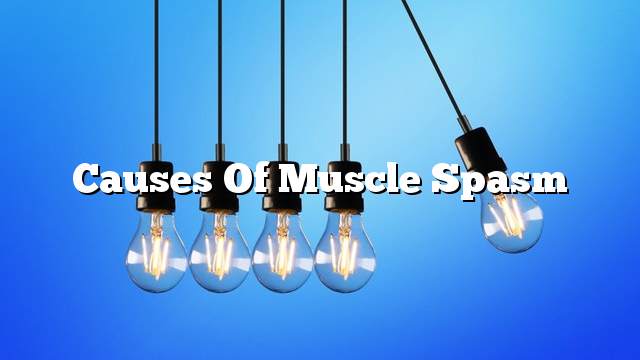Muscle spasm
Muscle spasm is a common problem that all people experience. It is an involuntary constriction in one or more muscles of the body. This can cause stiffness. The convulsions often occur after exerting effort in exercise without proper physical preparation and warm-up. This spasm is a spasm of effort, caused by lactic acid collected in the muscle and these convulsions continue from a few seconds to several minutes.
Causes of muscle spasm
There are many reasons that may lead to muscle spasms, the most famous of which are:
- Lack of minerals and salts in the body or depletion, such as calcium and magnesium is one of the main reasons that may lead to muscle spasms.
- Insufficient blood supply to the muscles, poor oxygen access due to a narrowing of the femoral arteries, and insufficient blood supply to the arteries due to sleep in the wrong way.
- Persistent muscle stress or pressure on a nerve may increase the risk of muscle injury.
- The weather plays an important role in muscle health. A physical effort under a blazing sun may result in intense depletion of sodium chloride through sweating. It is therefore advisable to drink plenty of water and to eat salty foods to make up for lost salts from the body. These convulsions continue from a few seconds to several minutes. Cold weather also plays a role in the process of spastic muscle contraction, and convulsions may reach the neck and neck.
- Spasms are sometimes associated with the nature of the person’s work. There are cramps known as spasms or biker spasms, because these occupations require concentration and loading on certain muscles, which can cause stiffness and cramps in those muscles.
- There are several factors, if combined, that may cause muscle spasms, such as disorders of the thyroid glands, diabetes, neurological diseases, anemia, or hypoglycemia.
- Muscle spasms may occur as a result of injuries in the area, such as bone fractures, which protect the muscles by preventing them from moving until they recover.
Muscle cramps may also appear due to side effects of some medications, such as:
Treatment of muscle spasm
When muscle spasms occur there are many things that can be done to help relieve them, such as massage, stretching, or muscle icing, or raising the temperature, or taking a bath with ipsum salt, and when doing massage it is advised not to focus on the muscle cramp; It may get worse.
There are other ways to prevent and treat muscle spasm, including:
- Eat more foods rich in vitamins, magnesium and calcium.
- Maintain body moisture by drinking fluids in sufficient quantities, especially water.
- Do well stretching exercises before exercising.
- Taking vitamin, calcium and magnesium supplements, especially for pregnant women, requires twice as much during pregnancy.
In most cases, self-care measures are sufficient to deal with muscle spasms. They may help remove them within a few minutes, but if you return frequently or for no apparent reason or if it lasts longer than usual, you should talk to your doctor or review immediately, It may refer to a health problem that requires treatment and medical intervention.
In many cases of cramping, you do not know what is the real cause, but there are things you can do to reduce the risk of muscle spasms, including eating a small amount of food before any physical effort, and prefer to eat foods that provide energy to the body.
Muscle spasm during exercise
Muscle cramps during exercise are common not only for amateurs, but also for professionals. Muscle spasms are frequent for long-term sports, such as football, sports, running and swimming.
Muscle spasm in the sport of football
The great effort made by the leg muscles as a result of 45 minutes of continuous running in one run, and the constant clashes and defenders that occur between the players in order to obtain or elongate the ball are the main reasons for increasing the possibility of muscle spasm in the legs, especially if not warm up Well before the game, or in cold climates.
Muscle spasm in combat sports
Confrontations, defenders and successive crashes in all types of combat games cause muscle spasms in different parts of the body. The period associated with these convulsions may be relatively long.
Muscle spasm in swimming sport
The water resistance of the muscles leads to increased effort when moving, the possibility of high muscle spasms in the absence of precautions. Muscle spasm in swimming is very dangerous because of the possibility of drowning in case it occurs, and advised to stick to the edge of the swimming pool when feeling a sudden jolt. These cramps usually occur in the muscles of the legs, because they are the most successful effort of the body muscles in swimming.
